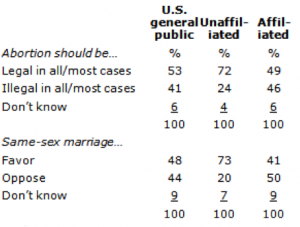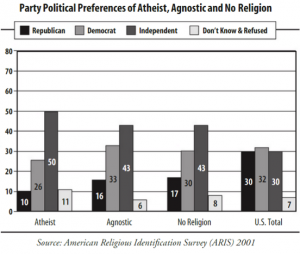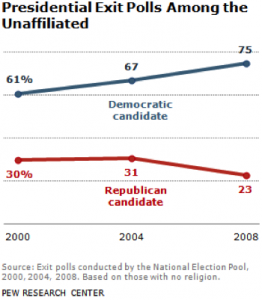The weekly report on research and demographics of the secular movement
by Julie Esris
The online publication The FINANCIAL has recently published an article that reports AmericansÔÇÖ willingness to vote for a non-traditional candidate. The article, which cites a Gallup poll, notes that Americans have greatly evolved in their thinking over the decades. For example, 74% of Americans today would vote for a qualified gay candidate, up from only 55% in 2007. In 1960, barely half of Americans said that they would vote for a qualified black candidate or a woman candidate. Today, more than 90% of Americans would vote for these people. The article also notes that AmericansÔÇÖ willingness to vote for a non-traditional candidate is largely correlated with his or her religious beliefs.
Predictably, the poll reveals that 92% of those who do not adhere to a religion would vote for a gay candidate. This number drops somewhat among Catholics (82%) and Protestants (62%). The pollÔÇÖs results for willingness to vote for an atheist candidate are even more predictable, with 91% of those who follow no religion, 58% of Catholics, and 47% of Protestants. ConverselyÔÇöand just as predictably, these numbers are roughly flipped when it comes to voting for an evangelical Christian candidate: 57% of those with no religion, 72% of Catholics, and 82% of Protestants. Few Protestants (44%) and Catholics (69%) would vote for a Muslim, whereas 82% of the non-religious would do so.
Socialist presidential-hopefuls are the most divisiveÔÇöand the least popularÔÇöcandidates, displacing atheists for this dubious honor, with only 74% of the non-religious, 46% of Catholics, and 28% of Protestants willing to vote for a socialist candidate. As a whole, only 47% of Americans would vote for a socialist.
It is also worth focusing more on how secular people vote, as they are largely overlooked in the political sphere. The Secular Policy Institute has recently released a report about secular demographics, which includes the voting habits of secularists. Atheists are more likely to describe themselves as independent voters, rather than Democrat or Republican. They are twice as likely to describe themselves as liberal, politically and socially (72% support legal abortion, 73% support same-sex marriage). Some seculars have socially liberal values alongside fiscally conservative ones, usually making them libertarian. Nonetheless, most secular people vote Democratic: in the most recent Presidential election, 75% of secular people voted for Barack Obama.
It is interesting to note that only 67% of religiously unaffiliated Americans are registered to vote, compared to 72% of the general public. However, 73% of those who explicitly identify as atheist or agnostic say that they are certain to vote compared with 53% of those who merely identify as religiously unaffiliated.
Some of these aforementioned statistics have obvious implications, while others are more nebulous. It makes perfect sense that the religiously unaffiliated are far more likely than their religious counterparts to vote for a gay candidate or an atheist candidate, and far less likely to vote for an evangelical Christian candidate. However, why are they more likely to vote for a Muslim candidate than the general population? After all, many secularists are against organized religion as a whole, not simply in terms of Christianity. The answer could simply be that a Muslim candidate seems to be less of a threat to church-state separation. Muslims are not a majority in America and generally do not demand special privileges that some evangelical Christian groups do. It would also be political suicide for a Muslim politician to try to instill Islam in law the way some Christian politicians do with Christianity.
It is also strange that socialists have finally unseated atheists as the least popular nontraditional presidential candidate. Or maybe it is actually not so strange. Being an atheist and being a socialist are somewhat taboo in America, in both cases largely because of the McCarthy ÔÇ£witch trialsÔÇØ of the 1950s. However, being an atheist simply means that one does not believe in God. Being a socialist inherently comes with a set of fiscal and political beliefs. People who become atheists after being religious are only required relinquish their belief in God; people who become socialists after being hard-core capitalists have to undergo much more dramatic changes in belief. In short, it is easier to become an atheist than to become a socialist. It is possible that because of this, the perception of who an atheist is is changing much more quickly than the perception of who a socialist is: There are still a lot of people who equate socialism with the totalitarian government in communist Russia.
And finally, why do atheists tend to describe themselves as independent voters? Why do atheists and agnostics tend to vote Democrat, even when they support libertarian or other independent candidates? And why are atheists and agnostics more likely to vote than secular people as a whole? The short answer to all of these questions could simply be eight years of George W. Bush. Among atheists, the Bush era is a bitter aftertaste of religion getting in bed more than ever with politics. Perhaps atheists identify as independent because in America both major political parties have to at least pretend to be somewhat religious. And if atheists do feel this way, then why do they still largely vote Democrat?
Although libertarians, for example, might ideally vote for a libertarian candidate, maybe they are worried that their vote for this candidate could facilitate a religious RepublicanÔÇÖs winning of the election. Perhaps in their minds they are voting for ÔÇ£the lesser of the two evils.ÔÇØ As for why atheists are more likely to vote than secular people as a whole, it could be that many of these secular people simply donÔÇÖt think about religion one way or another. They werenÔÇÖt raised in religion, they donÔÇÖt follow it, and they also really donÔÇÖt care about. It is possible that people who identify explicitly as atheist or agnostic feel more threatened by religion and want to make sure that they are increasing the chances that a less-conservative, less-religious candidate will get elected.
All of these speculations are, of course, speculations. It would be worth conducting another poll in which respondents are asked for explanations about their attitudes when votingÔÇöif they are voting.
